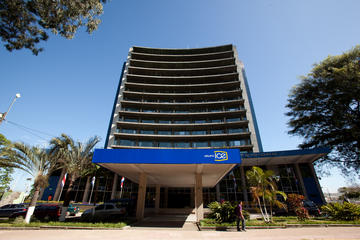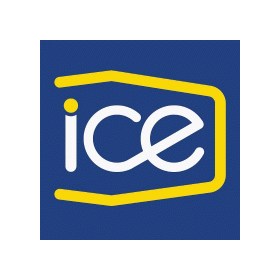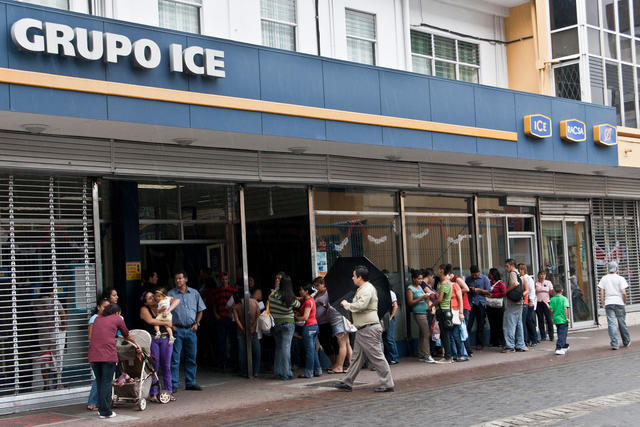Costa Rica News – The energy that private generators sell to ICE could be lower priced than it currently is, but the system prevents it.For this reason, the Regulatory Authority for Public Services (Aresep) is looking to make their price bands more flexible.
 In order to modify the system, private companies could charge less per kilowatt that they sell to the Costa Rican Institute for Electricity (ICE). The Institute itself should then reduce the tariffs for customers.
In order to modify the system, private companies could charge less per kilowatt that they sell to the Costa Rican Institute for Electricity (ICE). The Institute itself should then reduce the tariffs for customers.
In agreement with Aresep, the intention to search for a new mechanism arose from two energy purchasing comparisons that ICE conducted, in which all providers offered prices which were lower than the established level.
This is how the 2012 call occurred, when ICE received 100 megawatts from wind power and 40 megawatts from water power. There are also some figures from 4th Februrary this year, when the demand was for 40 megawatts of wind power and 30 megawatts of water power.
“Lowering the levels is an incentive for price reduction: it promotes competence, efficiency and it allows for more operators to get involved”, said Aresep’s advisers.
Price bands for privately-sourced energy were created by a regulator on May 2011. This order was just put in place for plants which were created from that point, not from existing ones.
To impose fixed upper and lower limits, facts such as profitability, operating costs and investments all had to be taken into account.
The first band was designed in March 2013 and centred on water plantations. From this, every kilowatt could be valued at between ¢49 and ¢82.
In September of this year, it was established that new wind projects should commercially sell each kilowatt from between ¢44 and ¢65.
Without their own bands, this year, they stated that solar energy and biomass products should be adapted to the same regulations that are in place for hydroelectric power. This measure is in place until Aresep comes up with its own standards.
Today, ICE generates 74% of the country’s electrical energy; the other 26% comes from generators which are not state or cooperative based. The Law 7,200 established a 15% limit on the purchase of energy from private companies.
Last year, ICE invested ¢59,417 million in private energy, at an average of ¢37 per kilowatt. With this payment, they generated 1,595 million kilowatts.
As well as widening the bands so that certain energy projects can become part of the National Electrical System (SEN), Aresep is hoping to create a band for the 28 plants which were already in operation.
Last December, it became regulated that existing private companies – regardless of which type of energy they concern themselves with – would only be authorised to charge ¢37 per kilowatt.
“Older plants have fewer operating costs, due to their depreciation. By also creating a band for them, it gives them the opportunity to offer even lower prices and to compete with the newer plants”, the Regulatory Authority explained.
This sale price set by ICE (¢37/kilowatt) is not the final price that the customer will be charged.
Tariffs purchased by customers are calculated to include operating costs, transmission and distribution.
As such, the Institute will be charging its clients the final figure of ¢91 – almost three times the cost price.
Aresep insists that this new methodology will bring only benefits to non-State generators and because of that, “they should be very happy”.
In this case, however, it is the private companies who have doubts about the initiative.
In fact, the public meeting which was organised to gauge whether the change would be supported (held on Wednesday) showed some desire to suspend the initiative in favour of a more preventative measure laid out by representatives from the hydroelectric project, Platanar.
On the 1st August, employees from that plant went to the Litigious Administrative Tribunal upon with the allegation that Aresep is forgetting about the “environmental factors”.
The Costa Rican Association of Energy Producers (Acope), which groups together private companies, agrees with this complaint and is questioning the hypothetical data which Aresep is using as a base. This latter point refers to other projects which are still not yet completed and tested.
Mario Alvarado, Director of Acope, criticised Aresep’s programme, saying that the proposed rules are not clear and said that he fears a negative effect on current contracts.
“In the event that they will later want to increase the bands, we feel that it should be done symmetrically: an equal increase and decrease. If their competence has shown that the proposed values tend towards the lower level, there shouldn’t be anything to worry about”, he declared.
Carolina Mora, spokeswoman for Aresep, explained that although environmental factors are irrelevant in the setting of price bands (as well as being difficult to calculate), they are working on implementing them in the future.
She later added that she was not referring to complaints registered by private companies, because these would be dealt with in the public meetings.
“It would surprise me, but if these businessmen are so negative, and if they are able to justify it, this proposal won’t pass”, she said.
Translated by Hazel Diaz from La Nacion

